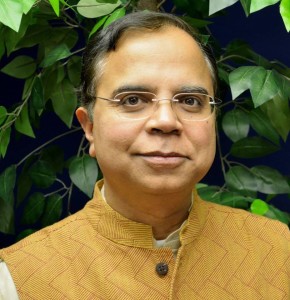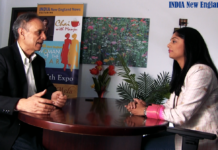BOSTON—The death of legendary music composer Khayyam this week was felt around the world in the Indian and South Asian communities, and Boston was no exception.
“Khayyam belonged to the generation of music composers who created melodies to touch the soul,” said Shekhar Shastri, a Lexington, MA resident who is also a singer and follows the Indian music industry.

National award winning Bollywood music composer Mohammed Zahir Hashmi, who was known only as Khayyam in his musical journey, passed away Monday night in a private hospital in Mumbai following a brief illness. He was 92. He is survived by his singer wife Jagjit Kaur.
“For Khayyam, the poetry was important, and he got down to composing songs that brought out the deeper meaning, enhancing the essence and the intended purpose of the cinematic plot,” said Mr. Shastri. “For example, ‘Woh Subah Kabhi to Aayegi’ became a perennial call for hope in a conflicted society.”
Mr. Shastri said that his favorite Khayyam songs are those sung by Mohammad Rafi such as: ‘Jaane Kya Dhoondti Rehti Hein Ye Aanken Mujhme’, ‘Jeet Hi Lenge Baazi Hum Tum’, and ‘Theheriye Hosh Mein Aa Lun To Chaley Jaiyega’.
“Then we remember Khayyam for immortal songs from Umrao Jaan such as ‘Dil Cheez Kya Hai’ and ‘In Ankhon Ki Masti’, which melodiously brought to fore the story of the legendary poet-courtesan Umrao, which in itself underscores the theme that creativity often takes birth in a context of struggle,” Mr. Shastri said. “With the passing away of Khayyam, we say goodbye to one of the last flag-bearers of the golden era of Hindi film music.”

Indian American singer Anuradha Palakurthi of Weston, MA, said Khayyam insisted on only working with the best of poets. And the music brought life into the poems – like in Phirchidi Raat Baat Phoolon Ki of Bazaar, one of Ms. Palakurthi’s sentimental favorites.
“As you listen to great songs like Dikhayediye Kyun, Baharon mera jeevan bhi sanwaron, E-dil-e-naadan, Kabhie Kabhie, Dil Cheez, one could easily ask if the creation of poem was done with the music in mind,” added Ms. Palakurthi. “Such was the greatness of Khayyam saheb’s compositions. His compositions are also so unique and deceptively hard to sing. I’m still trying to master ‘baharon.”
While Khayyam was known for his music in Bollywood classics like “Kabhie Kabhie”, “Trishul”, “Razia Sultan”, “Noorie” and “Umrao Jaan”, he also composed music for Meena Kumari’s album, “I Write, I Recite” featuring her singing her own poetic compositions.

Adorned with the National Award, the Sangeet Natak Akademi Award and a Padma Bhushan, Khayyam was admitted to the Sujoy Hospital in Juhu last week for a lung infection. Having a keen ear for music, he started his musical career from Ludhiana at the age of 17.
Mohan Subramaniam, one of the prominent Bollywood singers in Boston and a professor at Boston College, said Khayyam was greatest musicians of the golden era of Hindi film music.
“One of the last doyens to leave us from the golden era of Hindi film music that we were so fortunate to grow up in,” said Mr. Subramaniam. “While there so many hindi film music gems of his to pick from (Baharon mera jeevan bhi sanwaaron from Aakri Khat is my favorite), Khayyam Sahab has also provided some beautiful music for Begum Akhtar’s ghazals — my favorite “Khushi ne mujhko thukraya hai, dard-o-gham ne paala hai; Gulon ne be-rukhi ki hai, toh kaanton ne sambhala hai.”
Husband and wife team of Harish and Binni Dang, who hosted the popular Sounds of India radio program for 40 years in Boston, said Khayyam’s death of truly an end of era.

“It is so hard to pay tribute to a musician like Khayyam” said Mr. Dang. “He was a great guy with a heart of gold.”
Mr. Dang said that Khayyam donated all his money to a trust, which takes care of Bollywood professionals who end up in trouble.
“Music reflected his inner thoughts,” said Ms. Dang. “Dil khol ke rakh diya.”
Khayyam was honored with the National Award, and a Filmfare Award, besides several other honors for his melodious music in “Umrao Jaan”, starring Rekha, Naseeruddin Shah and Farooque Sheikh. Khayyam’s non-film songs are equally loved by his fans, especially “Paaon padun tore shyam”, “Brij mein laut chalo” and “Ghazab kiya tere vaade pe aitbaar kiya”.
Ghazals, thumris, dadras and other genres of Hindustani classical music were Khayyam’s forte. In an era when orchestra pop reigned, Khayyam was what many in Bollywood referred to as an artiste of refined expertise. He revelled composing songs in these intrinsically Indian genres for films such as “Anjuman” (1986), “Razia Sultan” (1983), “Bazaar” (1982), “Dil-e-Nadaan” (1982), and “Noorie” (1979). He was equally effective scoring simpler tunes that complimented the poetry of Sahir Ludhianvi in “Kabhi Kabhie” and “Trishul”, or Gulzar in “Thodisi Bewafaii”. These films were musical hits
Khayyam started off composing as Sharmaji of the Sharmaji-Varmaji composer duo, which created music for the 1948 film, “Heer Ranjha”. His partner, Rahman Varma, however, left Bombay after Partition
Five years on, it was time for Khayyam’s solo break. He scored music for the 1953 hit, “Foot Path”, starring Dilip Kumar and Meena Kumari. Although Timir Baran was credited as the primary composer of the film, its success, and Khayyam’s natural tendency to thrive with classical notes impressed all. The rest, as they say, is history. Early hits included songs in films such as “Phir Subah Hogi” (1958), “Shola Aur Shabnam” (1961) and “Aakhri Khat” (1966) – the last mentioned marking superstar Rajesh Khanna’s entry into Bollywood.
(Some background information in this article was used from INE News services.)
















